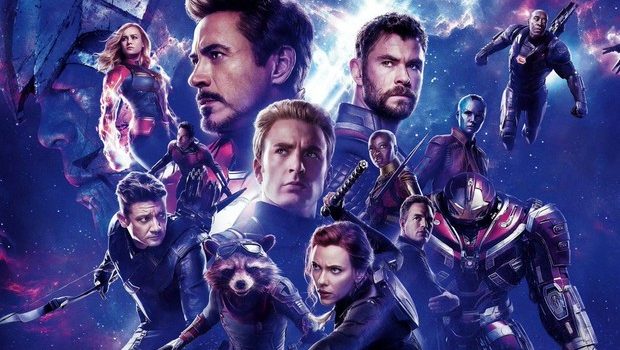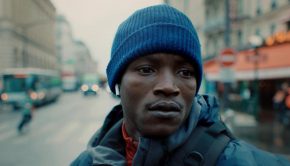Avengers: Endgame – Film Review
Reviewed by Damien Straker on the 30th of April 2019
Disney presents a film by Anthony Russo and Joe Russo
Produced by Kevin Feige
Screenplay by Christopher Markus and Stephen McFeely based on ‘The Avengers’ by Stan Lee and Jack Kirby
Starring Robert Downey Jr., Chris Evans, Mark Ruffalo, Chris Hemsworth, Brie Larson, Scarlett Johansson, Jeremy Renner, Don Cheadle, Paul Rudd, Zoe Saldana, Karen Gillan, Danai Gurira, Josh Brolin and (the voice of) Bradley Cooper
Music by Alan Silvestri
Cinematography Trent Opaloch
Edited by Jeffrey Ford and Matthew Schmidt
Running Time: 181 minutes
Rating: M
Release Date: the 22nd of April 2019
Contains some spoilers
Avengers: Endgame is a colossal disappointment. If the Marvel Cinematic Universe’s (MCU) weakness is resisting change, the déjà vu of this supposedly all-important bookend is its ultimate hamartia. ‘Seen it all before’ adequately describes Endgame’s failure to surprise and cynical design where scenes and locations from previous Marvel films are dubiously revisited to prolong the unnecessary three-hour running time. Meanwhile, the hashtag #DontSpoilTheEndgame has been hammered by the studio as if to suppress how few shocks and innovations the plot genuinely offers.
The film’s deliberate fanfare and failure of imagination is comparable to a clip show from The Simpsons where old episodes are referenced and stitched together to give the illusion of a new narrative. Endgame is not simply about its heroes restoring world order but Disney and Marvel reassuring their fanbase that they will never be subjected to the spontaneity of Infinity War’s (IW) brilliant ending again. After twenty-two films, they deserved a stronger and riskier finale for their loyalty.
Endgame opens with an eerie sequence where the family of Hawkeye (Jeremey Renner) disappears. It then reunites Tony Stark (Robert Downey Jr.), Carol (Brie Larson), Captain America (Chris Evans), Thor (Chris Hemsworth) and Black Widow (Scarlett Johansson). After they share an unexpected encounter with Thanos (Josh Brolin), the story forwards five years. The Avengers continue grieving for the fifty percent of the population that Thanos eliminated, including several friends.
Following the re-emergence of Ant-Man (Paul Rudd) from the quantum realm (somehow), a plot is hatched by some of the Avengers to travel back in time and recapture the Infinity Stones before the period where Thanos uses them to evaporate their allies. The scheme involves convincing all the major living players this is a worthy mission and then revisiting old locations including Asgard, Star-Lord’s intro in Guardians of the Galaxy (2014), the New York City battle from the original Avengers (2012) film, and Vormir where Red Skull awaits.
Each Avengers film has edged closer to the self-seriousness of DC and Fox that Marvel once opposed. Showing the Avengers as wounded and battle-worn intends to add emotional heft to proceedings. Given IW’s ending, the mood is understandably bleak. The actors also capably express feelings of defeat and helplessness. However, it becomes apparent that the exposition’s lethargy and characters’ downward stares are as much about padding as conveying a sombre mood.
The film’s opening is slow, dour and talky. The uneventful two-hour setup could hardly be deemed stylistically consistent either. The feelings of grief dispel in favour of goofball humour, including the Hulk (Mark Ruffalo beneath dodgy CGI) taking selfies with young fans, and Ant-Man’s quick and admittedly humorous quips. Paul Rudd is a shining light because of the levity and laughs he effortlessly contributes to dialogue-heavy scenes. Yet there are moments when the tone is unsure of itself such as an unintentionally hilarious sight of the Hulk wearing a suit and tie at a funeral.
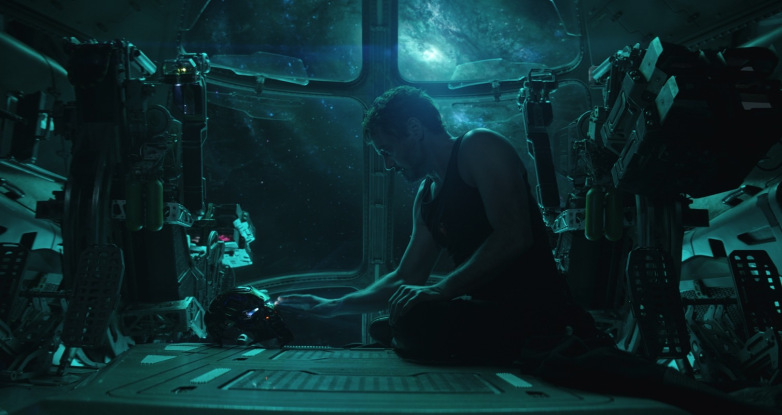
The ‘anything goes’ approach results from the directors, Anthony and Joe Russo, searching for a unique filmic style beyond a slickly engineered but sterile product free of memorable sounds and images. The novelty of most superhero films increases when they have their own consistent style, such as Black Panther’s African heritage or Captain Marvel’s pop culture gimmicks. Endgame’s first half is not distinctive or kinetically exciting because it orchestrates very few set pieces. Without the creativity of the action scenes, the strength of the series, there is nothing else to provide energy.
IW benefited from an organic narrative structure where it ambitiously tailored the action to each hero’s ability. Comparatively, Endgame suggests the Russos already exhausted their best ideas and have resorted to extensively protracting the narrative until the final battle. The most telling sign of story fatigue is using the tired ‘get the band back together’ trope to reunite three or four characters who predictably overcome their initial trepidation. Why the film also opens with Hawkeye, a character without his own film, and then paints him as a samurai in this sequence is anyone’s guess.
Since there are few setbacks during the time travel scenes the call-backs and dialogue merely resemble fanfare. Even Thor’s change is cosmetic and has no bearing on the story. Some have described it as Marvel’s ‘greatest hits collection’. The approach is shameless after more than twenty interconnecting movies, several of which were derivative. There are also inevitable time travel plot holes where past scenes are altered but weirdly fail to disrupt the future. A character is knocked out before he can meet his teammates, which has little consequence bar a lightly comic scene at the end.

Unless you are interested in the parentage of two characters, the mid-section is a lame highlights reel and leaves Marvel’s villain problem unresolved. Thanos’ first scene is one of the few major surprises but does not hold up to scrutiny. He is now a farmer, which is apparently meaningful in the comics but given little context here. His input includes highly contrived scenes where he discovers the Avengers plans through luck and confronting his daughters, Nebula (Karen Gillan) and Gamora (Zoe Saldana), in moments rehashed from the superior IW.
After the overlong build-up, the final battle thankfully elevates the emotional registers. It is undeniably stirring seeing all the characters unified in the fight together. There is far more tension than the rest of the story too, particularly a long-awaited confrontation. Though the battle barely distinguishes itself from other major MCU climaxes. For example, it features another giant airship, which has been the most overused trope throughout Marvel’s chaotic third acts.
When the camera steers away from the characters fighting Thanos, the battle remains an overly CGI-heavy fight where the background action is largely superfluous. It lacks the grandstand moments of IW, such as when Thor slammed down in Wakanda or when the hamster wheels burst up from the ground. Instead, it is a hodgepodge of pop culture staples, including video games, The Lord of the Rings, football, and, most hilariously, a unicorn.
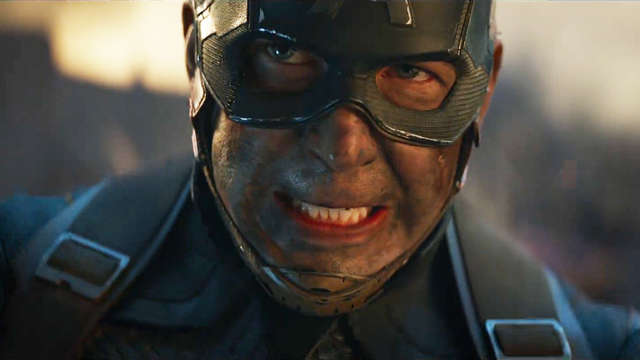
Despite the long running time, Endgame undermines its best new heroes and the inclusiveness of its prequels. Captain Marvel’s Carol is treated like a deus ex machina device. After an early cameo, she inexplicably vanishes until the end. Her solo entry was funnier and more spectacular. Similarly, the Black Panther characters barely feature. Some will argue it is simply because of IW’s ending, but it is still how the Russos and their writers have chosen to tell this story that marginalises the characters.
Perhaps Endgame is simply an old-fashioned, predominantly white male war movie. The comparison is summarised by a Kitty Kallen tune playing to a slow dance at the end, the emphasis on family, and the lakeside cabin with an American flag outside. It offers a useless hypothesis about warfare and grief where some sacrifices are made for the greater good. Yet simultaneously, by revisiting old episodes and undoing meaningful climaxes, including IW’s ending, it sabotages its own thematic exploration of grief in favour of commerce.
It is unsurprising that key characters return but Marvel could have resisted announcing sequels before Endgame. It recalls past criticism of Game of Thrones where some argued death was cheapened by resurrecting a major character. The toughest aspect of life is letting go when death feels unjustified or unreasonable. Endgame’s thematic goal is hurt by mass resurrections, and the time travel device and Marvel’s de-aging technology implies a dubious safety net for reviving characters in the future.
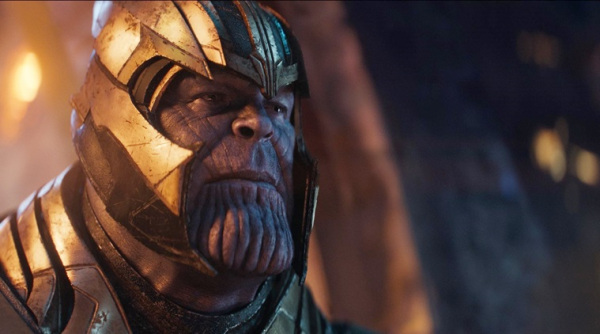
At a packed screening, there were some laughs from the young audience but long stretches of tepidness where people sat very still as if waiting for something to happen. Some have called it Marvel’s masterpiece because it is slower, but its measured approach also hides an uneventful story that rehashes old scenes and locations and fails to establish a consist tone and thematic line.
Nonetheless, it is smashing records and will provide fans will everything they want. However, the fanfare feels counter-intuitive to the exploration of war and death, where people are never shielded from experiencing loss. As a result, this is not a finale with a tough universal truth about longstanding grief but a commercial building block where hard choices and consequences can be reversed. It is an escalator to nowhere rather than a definitive endgame.
Summary: This is not a finale with a tough universal truth about longstanding grief but a commercial building block where hard choices and consequences can be reversed. It is an escalator to nowhere rather than a definitive endgame.


